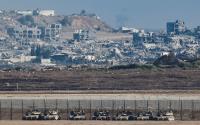WASHINGTON, D.C., Dec 2 (OneWorld) On the 20th anniversary of the most lethal accident in corporate history, the survivors of the 1984 Bhopal disaster are finding new allies in their fight for justice.
|
Amnesty International this week released a ground-breaking new report on the continuing impact of the leak of some 27 tons of highly toxic methyl isocyanate gas from Bhopals Union Carbide plant exactly 20 years today, while activist shareholders of Dow Chemical Company, which bought Union Carbide three years ago, vowed to press their efforts to have the company take responsibility.
Bhopal was the greatest human rights disaster arising from corporate negligence, said Amnestys secretary general, Irene Khan, who said the failure of U.S.-based companies to compensate victims underlined the importance of making multinational business accountable across international borders.
Companies have elected jurisdictions where governments are not strong enough, willing or able enough to enforce regulations, she said. The legal gap that allows this to happen must be closed so that a disaster like Bhopal is not repeated.
Between 7,000 and 10,000 people residents of shantytowns that abutted Union Carbides pesticide plant in Bhopal, India, died within minutes or hours of the gas leak which the company has long insisted resulted from sabotage.
Since then, an estimated 15,000 more have passed away as a result of their exposure to the gas, according to public-health experts.
More than 150,000 survivors, including children born to parents who were exposed to the gas, suffer some form of chronic illness or damage caused by the incident including cancer, neurological problems, chaotic menstrual cycles, and mental illness. More than 50,000 of the survivors are considered too sick to earn a living.
In addition, community water supplies for more than 20,000 people were found to have been contaminated at the plant site with unsafe levels of mercury, carbon tetrachloride and other toxics and heavy metals. The site was abandoned after the leak in 1984.
In 1989, Union Carbide settled a civil suit brought by the Indian government by agreeing to pay US$270 million as compensation to people exposed to the gas. The company insisted, however, that the payment was made out of a sense of moral rather than legal responsibility since the facility was operated by a separate Indian subsidiary, Union Carbide India Limited (UCIL), in which Union Carbide held just over one half of the stock. It said that, under the terms of the settlement, the state of Madya Pradesh assumed responsibility for cleaning up the site.
To date, the settlement has provided an average of less than $500 to each of about half a million victims. The same group is expected to receive another $500 each over the next year as the Indian government distributes the accumulated interest on the original payment.
But activists insist that $1000 does not begin to cover the actual medical and related costs incurred by victims over the past 20 years, let alone the loss of livelihoods and what the U.S. legal system calls pain and suffering endured by the loss of loved ones and the daily hardship of living with chronic health problems.
Its really a pittance, said Rajan Sharma, the lead attorney for the Bhopal survivors since 1999. He and other activists spoke Wednesday with journalists in the United States and India via a teleconference organized by the International Campaign for Justice in Bhopal.
While the original settlement was designed for some 100,000 victims, the settlement money has been spread over half a million.
As important, the settlement failed to cover either criminal or punitive damages which would almost certainly be awarded if the leak had taken place in the United States or other western countries.
If this had happened in the United States, theres no doubt that Dow Chemical would (be liable), said Rick Hind, legislative director of the Greenpeace Toxics Campaign.
Broader remedies have indeed been sought in a 15-year-old case against Union Carbide and its CEO at the time of the leak, Warren Anderson, who has been in hiding for some years. The company has also refused to appear before the court.
The failure of both defendants to respond to the case was the subject of a resolution tabled earlier this year in the U.S. House of Representatives by New Jersey Rep. Frank Pallone (news, bio, voting record) and seven of his colleagues.
Its outrageous that this year marks the 20th anniversary of this tragic event and the CEOs of Union Carbide and its successor Dow Chemical remain absconders (from) justice, said Pallone last May when he introduced the resolution. It is unacceptable to allow an American company not only the opportunity to exploit international borders and legal jurisdictions but also the ability to evade civil and criminal liability for environmental pollution and abuses committed overseas.
He and his colleagues also sent a 23-page brief to a U.S. federal court in New York where survivors filed an action against Union Carbide in 1999. While the court dismissed the survivors claims on the grounds that the statute of limitations for personal injury had expired, an appeals court ruled that the plaintiffs could still pursue claims related to their exposure to contaminated groundwater and ask that the company be required to clean up the site.
On yet another front, a group of Dow shareholders are pressing their two-year fight for a resolution that calls on the company to provide a full accounting of possible liabilities it might face arising from the leak and the pollution of the site. At last springs shareholder meeting, the resolution gained the backing of the two largest state pension funds, those of California and New York.
Dow is feeling the pressure of public opinion, said Lauren Compere of Boston Common Asset Management which is handling the resolutions. The changing legal landscape (on corporate responsibility) means they will have to change their position and come to the table.
Compere noted Wednesday that Dow pulled from its website a statement that asserted that it had no outstanding liability for the Bhopal disaster after the shareholder group filed a complaint with the Securities and Exchange Commission (news - web sites) (SEC).
The Amnesty report, Clouds of Injustice, details how Union Carbide failed to take minimal precautions with respect to the storage of ultra-hazardous chemicals; to set up an emergency plan to warn local residents; ignored warnings about the possibility of a chemical reaction similar that which caused the leak; and withheld information critical to the medical treatment of the victims.
It also assailed Indian authorities for failing to adequately protect the inhabitants before and after the disaster; take adequate steps to assess the risks to the local community; or to consult the victims adequately regarding the financial settlement.
Bhopal shows how readily some companies can evade their human rights responsibilities, said Benedict Southworth, Amnestys campaign director. There is a real need for global human rights standards for corporations.
The (voluntary) UN Norms for Business are an important step in this direction, but to hold companies accountable and prevent disasters like Bhopal happening again, it is imperative to have enforceable standards that guarantee redress for victims, he added.






